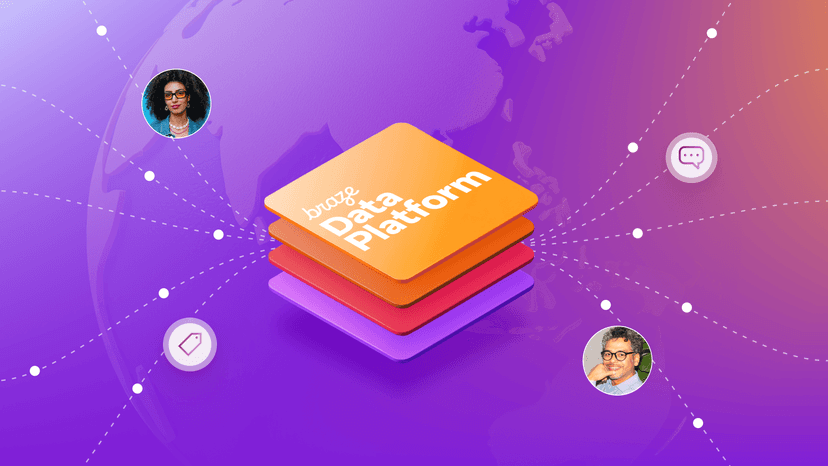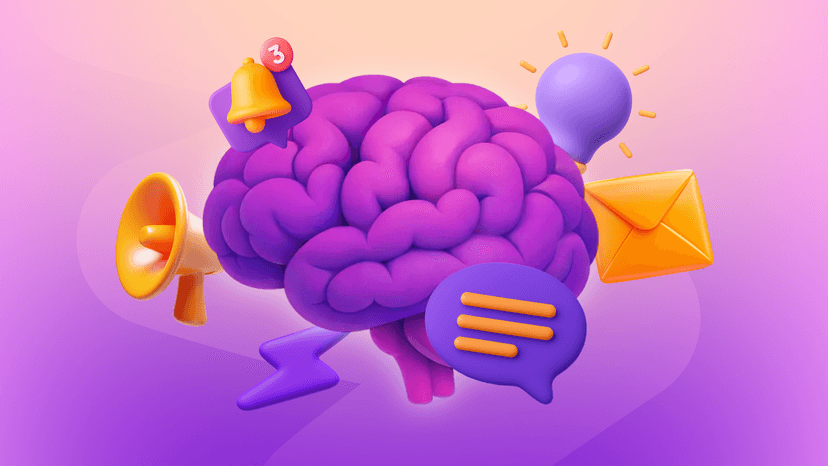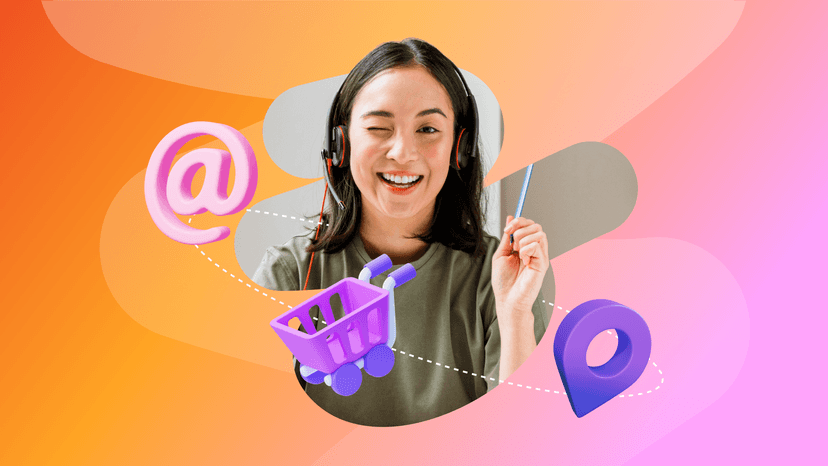How to Build an AI Marketing Strategy
Published on March 24, 2025/Last edited on September 12, 2025/23 min read
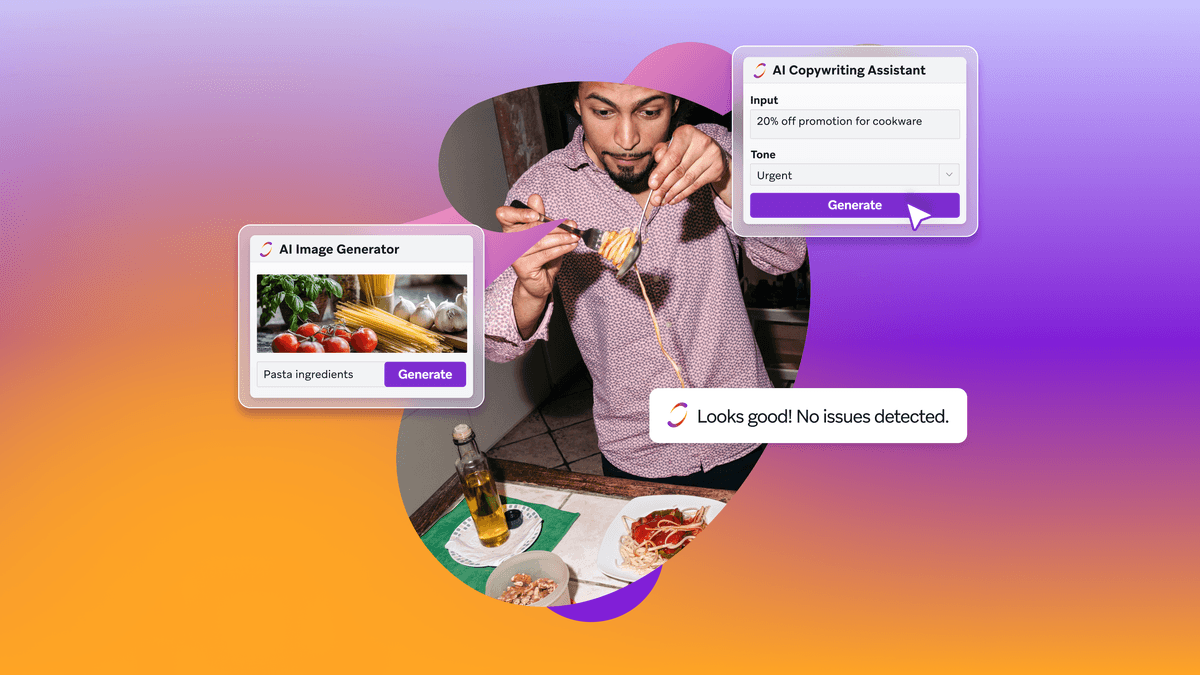

Team Braze
AI is no longer a futuristic idea in marketing—it’s already here, reshaping personalization and the way brands engage with customers, automate tasks, and optimize campaigns. Forward-thinking brands are demonstrating how artificial intelligence marketing solutions can deliver authentic, personalized experiences at unprecedented scale. These tools are revolutionizing content creation, freeing marketers to focus on high-level strategy while reducing resource demands.
Perhaps most importantly, sophisticated AI systems can now help you transform customer data into engaging content, tailored recommendations, and individualized customer journeys— automating the kind of meaningful experiences that build lasting customer relationships and at an unprecedented scale.
We’ve put together this guide to help you explore what AI marketing can do for your business and how to build an AI marketing strategy. In it, we’ll cover:
- Why AI in Marketing Matters Now
- What Is AI Marketing?
- How to Leverage AI in Marketing
- How to Create a Successful AI Marketing Strategy
- The Advantages of an AI Marketing Strategy
- 3 Examples of a Successful AI Marketing Campaign
- 12 Essential Artificial Intelligence Marketing Solutions and Tools
- How to Overcome Common Challenges in AI Marketing
- Final Thoughts
- FAQs
Why AI in marketing matters now
Businesses that embrace AI can gain a competitive edge by automating processes, enhancing personalization, and making data-driven decisions faster than ever—and doing so at quantities that would not be possible by humans alone. So, what makes AI marketing so important for brands today?
1. The explosion of data-driven marketing
Customers generate a lot of data—from website interactions and purchase history to social media engagement and behavioral patterns. Traditional marketing methods struggle to process and utilize this data effectively, with time and technology often preventing the full usage of this data. AI-powered marketing tools can analyze vast datasets quickly, transforming raw information into insights and intelligent decisions that help drive conversions and customer loyalty.
2. Efficiency and automation in a resource-constrained world
Marketing teams today face mounting pressure to do more with less. Many brands are seeing budgets shrink, workloads grow, and customer expectations rise. AI-driven automation helps businesses scale their marketing efforts without overextending resources. From content creation and email marketing to customer segmentation and campaign optimization, AI can assist or handle time-consuming tasks, allowing marketers to focus on strategy and creativity while extending their teams to be more productive.
3. Rising consumer demand for personalization
Modern consumers expect brands to understand their needs and deliver personalized experiences that are relevant to where they are, and where they are going in the future. AI enables marketers to create tailored content, product recommendations, and targeted campaigns based on real-time behavioral data. This level of personalization not only boosts engagement but also fosters brand loyalty and increases customer lifetime value.
4. The need for predictive insights and real-time optimization
With AI, marketers can move beyond reactive strategies and embrace predictive analytics. AI models have the ability to forecast customer behavior, identify trends, and optimize campaigns as data changes. Instead of waiting for a campaign to underperform, AI can proactively adjust messaging, delivery timing, and channel selection to maximize engagement and ROI. This can allow you to engage based on where customers are going, rather than where they have already been.
5. A competitive industry advantage
Businesses that fail to adopt AI marketing risk falling behind. Competitors using AI-powered tools are gaining deeper customer insights, building more personalized experiences, and driving higher conversion rates. The brands leading the AI revolution aren’t just experimenting—they’re embedding AI into their core marketing strategies, reaping the rewards of smarter, data-driven decision-making while creating more personalized customer experiences.
What is AI marketing?
Artificial intelligence marketing represents a fundamental shift in how brands connect with customers. By leveraging AI and machine learning technologies, marketers can now automate complex tasks, deliver truly personalized experiences at scale, and continuously optimize every touchpoint along the customer journey—all while freeing up valuable time for creative thinking and strategic planning.
The impact of AI on marketing isn't a future possibility, it's already embedded in many of our daily brand interactions. The way your inbox knows when to filter a message to spam? That’s AI. Or your online grocery shop that seems to know exactly which products will appeal to you. That could also be AI. These AI-powered experiences have become so seamless that we often take them for granted.
According to the 2024 Global Customer Engagement Review, 99% of marketers say their organization is already using AI and marketing teams are incorporating it into their operations. But they're moving well beyond just the traditional applications like content generation. Today's marketers are exploring AI's full potential across multiple dimensions. From sparking creative ideation and handling routine tasks to enabling real-time strategy optimization, deepening data analysis, powering predictive insights, and delivering truly personalized campaigns at a larger scale.
What is generative AI?
Generative AI is a type of AI that uses deep learning models to produce new content from existing data, such as images, text, and video.
For all intents and purposes, it’s a very elaborate autocomplete. It’s the same sort of thing you get when you type “the world’s best” into Google search and it suggests completing the phrase with “restaurants,” “airlines,” “beaches,” or “hotels.” But Generative AI does this in a much more sophisticated way. The most effective models have been trained on huge chunks of natural language provided by the internet and sites like Wikipedia. By seeing millions of examples of natural language, Generative AI is able to generate output and answer prompts based on the information it is trained on. It works similarly for image and video creation, too.
In the hands of marketers and creatives, this allows a new way to generate new ideas that keep their content fresh and vibrant across marketing efforts. By including controls for length and output language, Generative AI also makes it possible to adjust the content for the necessary language and message format with Live translation and editing right in the dashboard!
How to leverage AI in marketing
For marketers aiming to sharpen both their creativity and strategic thinking, AI is quickly becoming an essential tool. By handling time-consuming tasks, AI allows marketers to shift their focus toward higher-level strategy,creative innovation and extending their teams productivity.
Content creation
From our AI Copywriting Assistant, which helps you to create copy tailored to your goals to AI Content QA which performs quality assurance on your messages and the AI Image Generator to give you visuals in seconds, assets can be created much more quickly, reducing the burden on your creative teams.
Automating personalization
With AI-powered marketing, you can tailor messages, predict customer behaviors, suggest relevant content and personalize every interaction. Being able to experiment at every step of the customer journey means you can endlessly test new ideas to iterate and optimize to generate the right engagement in the right moment.
With the AI Liquid Assistant, you can tailor your message copy with a responsive chat assistant that generates, suggests, and improves your message personalization using plain-text prompts.
Braze Personalized Variant is designed to determine the message for each individual based on their unique behaviors, preferences, and attributes. This automates personalized messages to each individual that help increase engagement and conversions for each campaign.
Streamlining processes
An overwhelming 79% of our survey respondents view AI favorably, citing its ability to automate routine work, allowing them to carve out more time for creative problem-solving.
This shift helps marketers move beyond day-to-day execution, and leverage AI in marketing to open the door to new opportunities. In the US, enthusiasm is even stronger, with 87% of marketers thanking AI for reducing routine tasks and giving them more room to think creatively.
Data-driven actions
Modern marketers are overwhelmed by the sheer volume of customer data available. The majority of our survey participants struggle with data management, and 54% report that a lack of access to the right technology is holding them back from making data-driven decisions.
AI-powered tools solve this challenge by rapidly analyzing and categorizing data, driving actionable, accurate insights. AI-driven platforms help identify patterns in consumer behavior, predict future trends, and segment audiences more effectively.
By automating data analysis, marketing teams can make informed decisions, optimize messaging, and drive better engagement on datasets that were previously too large to understand. Marketing teams that are embracing AI are using—or planning to use—it to tackle this challenge head-on, applying AI to data analysis, predictive insights, and personalization to create more effective, targeted strategies.
How to create a successful AI marketing strategy
Building an AI-driven marketing strategy requires a structured approach to drive success. Implementing AI effectively involves understanding where it can deliver the most impact and adopting a phased rollout to maximize efficiency and ROI. Following these five key steps can help you create a well-structured AI marketing strategy.
1. Audit your existing marketing efforts
Before integrating AI into your marketing strategy, conduct a thorough assessment of your current processes. Identify inefficiencies, bottlenecks, and areas where automation or AI-driven insights could enhance performance. Key areas to review include:
- Content creation workflows
- Customer segmentation and targeting methods
- Campaign performance metrics and optimization strategies
- Personalization and engagement effectiveness
- Data management and analytics capabilities
2. Define AI marketing goals
Clarify what you want AI to achieve for your marketing efforts. Align your AI strategy with business objectives and determine which areas to prioritize. Common AI marketing goals include:
- Automating repetitive tasks (e.g., email marketing, content QA)
- Enhancing personalization through data-driven insights
- Improving customer segmentation and targeting
- Optimizing ad campaigns using predictive analytics
3. Choose AI-powered tools and technologies
Selecting the right AI tools is crucial to building an effective marketing strategy. Consider platforms that align with your goals and integrate seamlessly into your existing tech stack. Key AI-powered tools to explore include:
- AI Content Generation: Generate images, message variations, and email subject lines
- Predictive Analytics: Forecast customer behavior and optimize campaigns
- Personalization Engines: Deliver real-time recommendations based on user data
- Marketing Automation Platforms: Automate cross-channel customer journeys
4. Implement AI in phases
Rolling out AI gradually allows your team to adapt while measuring effectiveness. Start small with one or two AI-powered initiatives and scale up as you gain confidence in the technology. A phased approach could look like this:
- Phase 1: Automate simple tasks (e.g., AI-generated email subject lines, chatbots for FAQs)
- Phase 2: Introduce AI-driven personalization and predictive analytics for segmentation
- Phase 3: Use AI to optimize real-time customer journeys and campaign performance
5. Track AI performance and optimize
Once AI is embedded in your marketing strategy, continuously monitor its impact and make adjustments as needed. Define KPIs to measure success, such as:
- Conversion rate improvements
- Engagement and retention metrics
- Reduction in manual workload and operational costs
- ROI from AI-driven campaigns
- Customer satisfaction and feedback on AI-powered interactions
Use A/B testing coupled with AI-driven analytics, and machine learning optimization to refine your strategy over time. AI marketing is an ongoing process—regular optimization is often the key to long-term success and maximum ROI.
The advantages of an AI marketing strategy
Marketers today are under increasing pressure to drive business growth—whether through new customer acquisition, revenue generation, or customer retention—all while managing tighter budgets and fewer resources. To stay ahead in this challenging landscape, forward-thinking brands are turning to AI-powered marketing solutions to improve efficiency and outperform the competition. The benefits of an AI marketing strategy are clear.
1. Scaling and automating personalization
AI-driven marketing tools make it possible to automate personalization at scale by analyzing past customer behavior and identifying patterns among those who have or have not converted. This allows brands to deliver tailored experiences by automatically selecting the most effective campaign variations, channels, segments, and recommendations for each individual.
2. Boosting campaign performance
Machine learning algorithms can predict which marketing channels will be most effective, determine the optimal timing for campaign delivery, identify at-risk customers, and highlight audiences most likely to convert. With these insights, brands can enhance campaign performance and see long-term improvements in key metrics like conversions and revenue.
3. Accelerating campaign execution
Developing marketing campaigns—from creating visuals and writing copy to reviewing assets—can be time-intensive. AI streamlines these steps by assisting or automating parts of the process, reducing production time, and minimizing delays so brands can go to market faster.
4. Increasing productivity
AI-powered efficiencies can save time and help unburden busy teams. By automating content creation, assisting with quality assurance, and enabling more precise audience targeting through machine learning, marketers can spend more time being creative and strategic.
5. Strengthening brand engagement
AI marketing tools help brands to create highly relevant and engaging experiences that drive customer interactions. By delivering personalized content at the right time, companies can encourage higher open rates, more clicks, and increased conversions—ultimately fostering brand loyalty and building better relationships with customers
6. Reducing churn and improving customer targeting
Irrelevant content and poorly timed messages can create disjointed experiences that drive customers away. AI helps brands avoid these pitfalls by providing insights that improve audience segmentation and messaging strategies. Predictive analytics can also identify customers at risk of churning, allowing businesses to take action before it’s too late.
7. Enhancing productivity and sparking creativity
With AI handling repetitive and time-consuming tasks, marketing teams can shift their focus toward strategy and innovation. Freed from these types of burdens, marketers can work more efficiently and bring fresh, creative ideas to life.
8. Maximizing revenue opportunities
Historically, determining which content resonates, which channels drive the highest impact, and which users are most likely to make a purchase has been a challenge. AI changes the game by providing real-time insights that enable brands to engage customers in ways that drive more revenue.
3 Examples of successful AI marketing campaigns
A recipe for success: How AI helped foodora cook up better engagement
foodora is a leading food delivery service operating in over 700 cities across Europe, setting the standard for digital quick commerce. Their mission is simple: To provide a fast, seamless, and affordable experience that gives people more time to enjoy what truly matters. With a belief in delivering freedom, foodora allows customers to order what they love, whenever they want—without hesitation.
The challenge
foodora wanted to build stronger, more personalized relationships with customers—just like a good friendship that grows over time. However, their existing approach to customer communication was fragmented, relying on multiple platforms without predictive insights. This led to inconsistent messaging, missed engagement opportunities, and a higher churn rate.
The solution
By adopting Braze, foodora streamlined their customer engagement with a cross-channel marketing strategy that included email, push notifications, and in-app messaging. Leveraging BrazeAI™, they optimized their outreach and experimented with Intelligent Timing to deliver more relevant and timely messages to enhance satisfaction and loyalty.
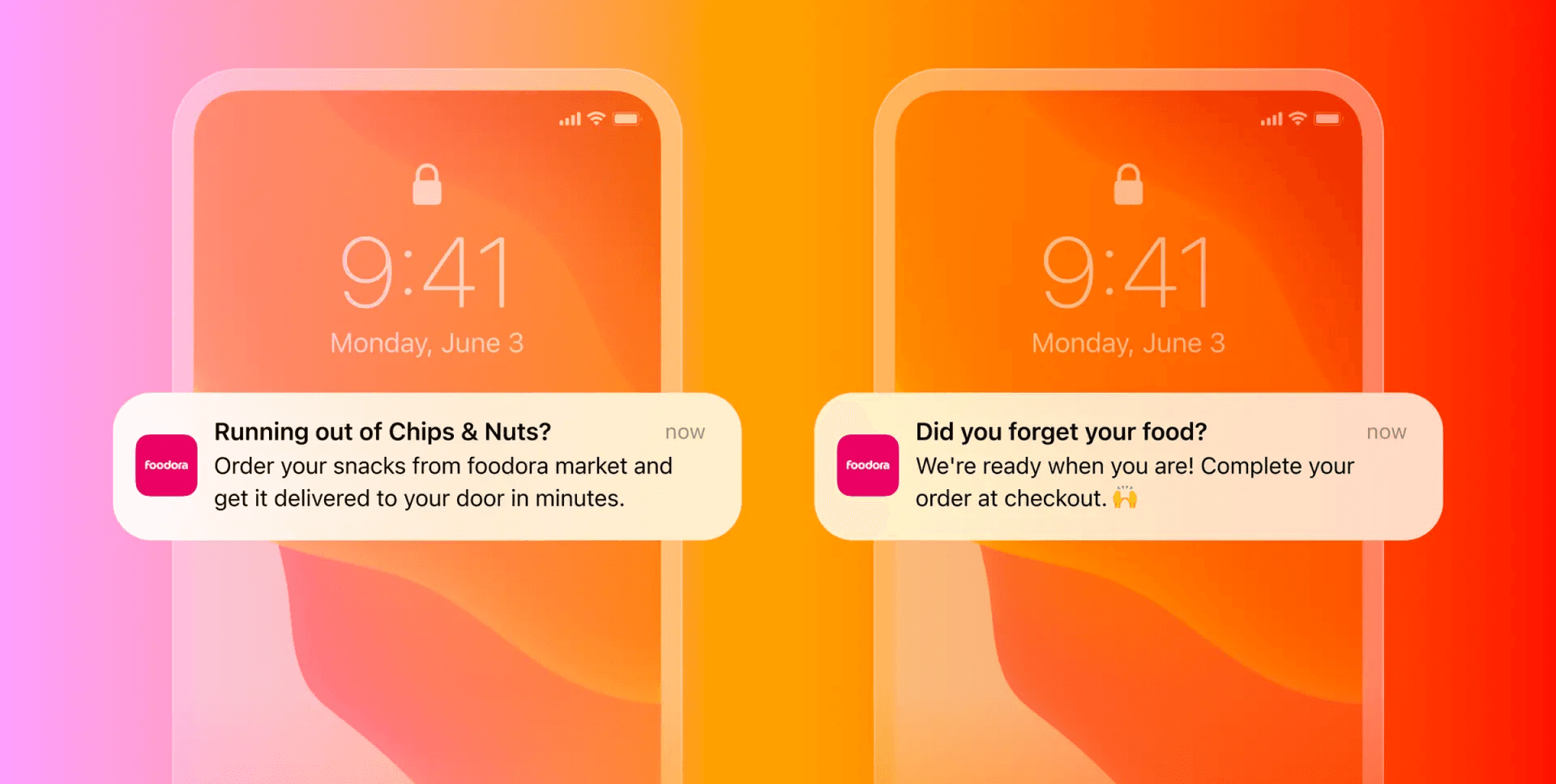
The results
With AI-driven marketing in place, foodora saw a major boost in customer engagement. Conversion rates climbed, revenue increased, and churn dropped—all while delivering a smoother, more personalized experience for their customers.
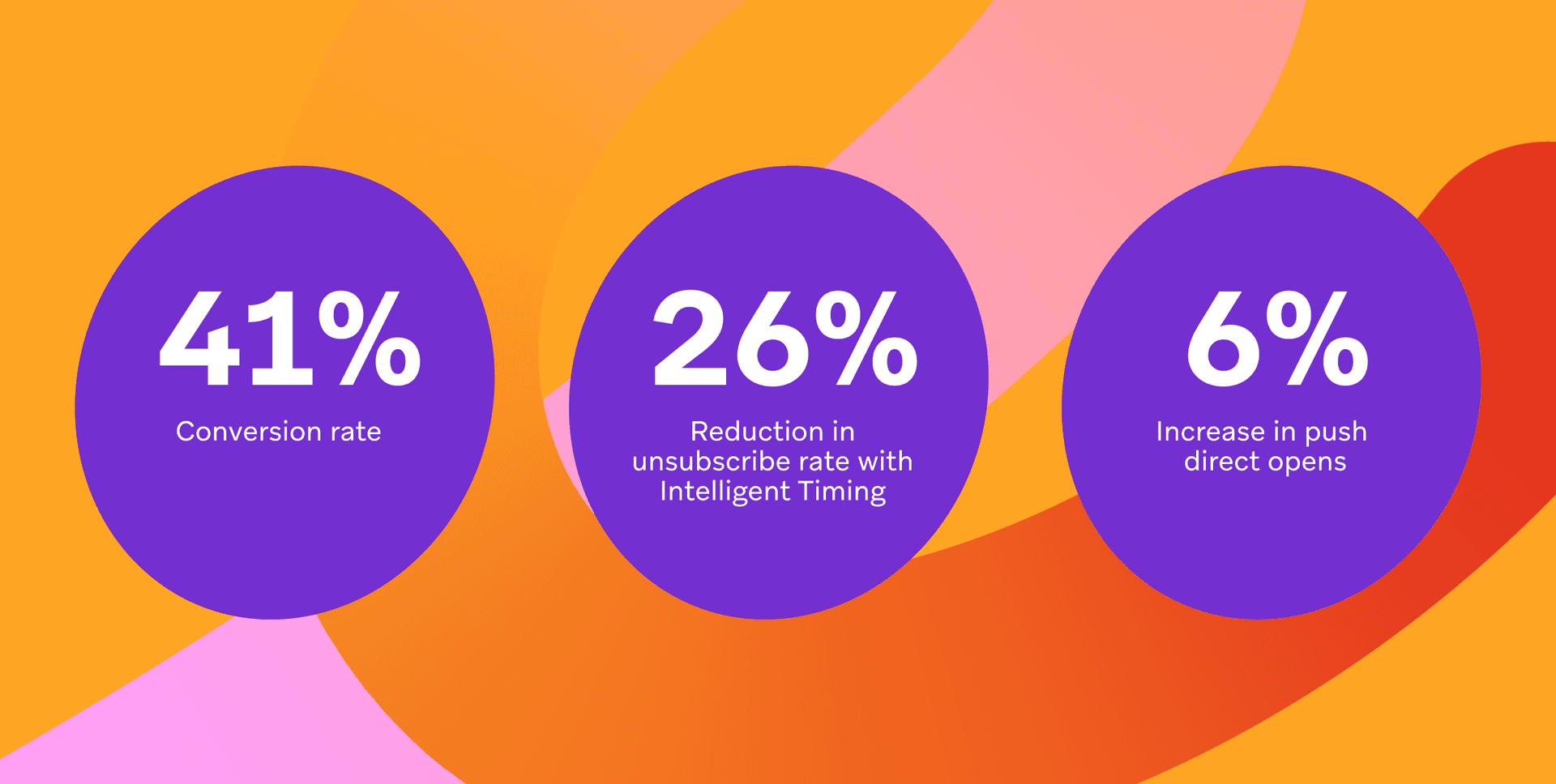
Tagliatelle-ing a new story: AI-powered messaging that delivers
Circus Group has always been about revolutionizing food delivery by blending technology with the flavors customers love. Based in Germany, they’re leading the way with AI-powered solutions, robotics, and proprietary software, shaking up the trillion-dollar food industry. Their goal? To deliver fresh, affordable meals while making every customer interaction meaningful and valuable.
Recognizing the need for stronger customer connections, Circus Group launched Pazza Pasta, a brand built on market insights around quality, variety, and affordability. To take engagement to the next level, Pazza Pasta set out to refine their communication strategy—starting with a new approach to mobile messaging.
The challenge
Pazza Pasta saw an opportunity to reach their most engaged customers through WhatsApp. However, they needed a way to scale their messaging efforts without draining resources. They achieved this by designing a WhatsApp campaign that was both impactful and easy to manage.
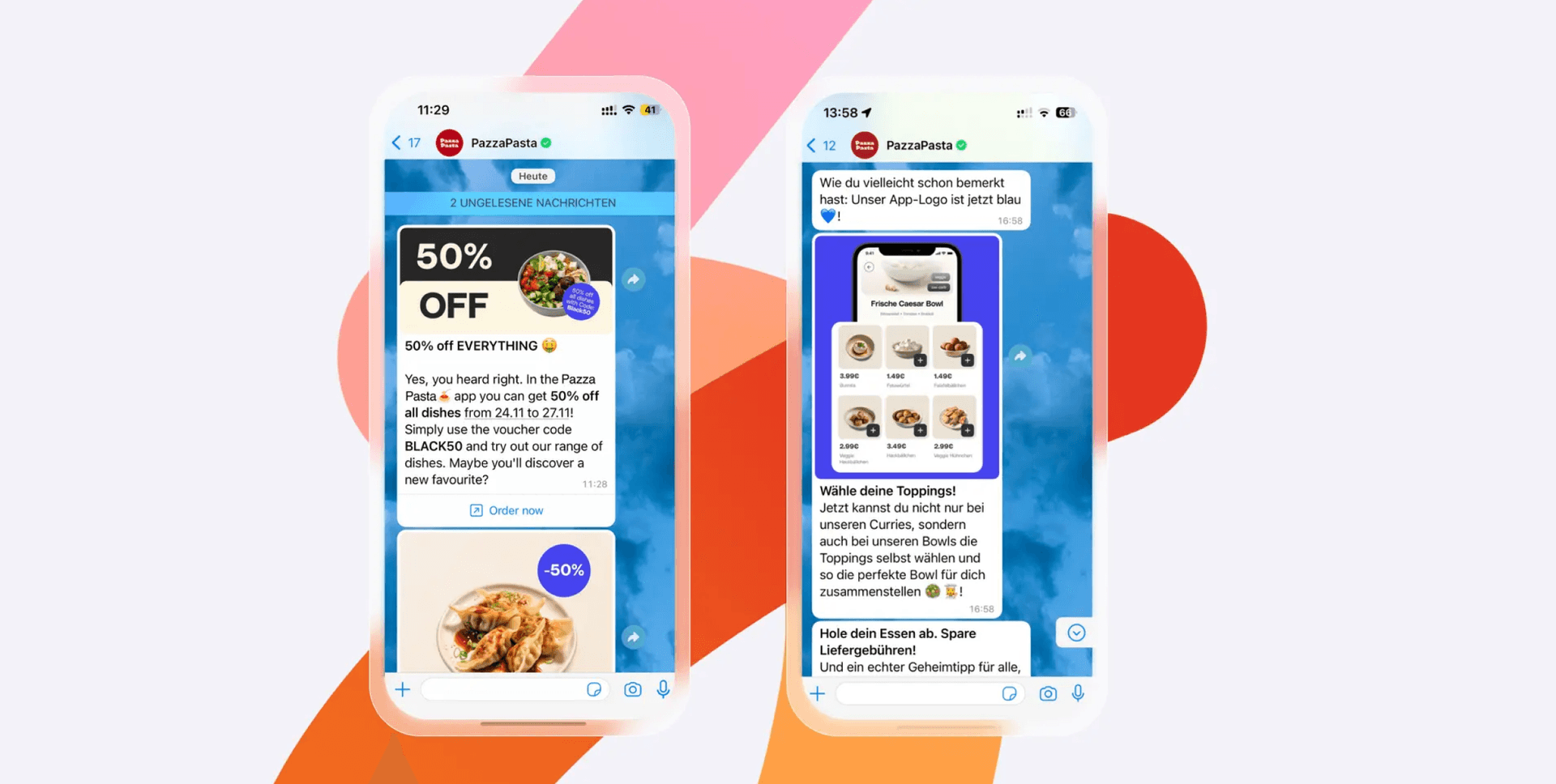
The solution
By leveraging the Braze platforms ’s personalization and journey orchestration tools—along with native WhatsApp support—Pazza Pasta quickly launched a fully automated WhatsApp program. They made use of our versatile and advanced feature set (including Braze Catalogs for dynamic content personalization), our partner ecosystem that includes Snowflake, and our seamless, direct WhatsApp integration. They were early adopters of AI Item Recommendations and Personalized Paths. They used AI Item Recommendations to send push notifications and WhatsApp messages with recommended dishes from the Catalog, and used Personalized Paths to test two ideas: Using the purchase event as a training source and using the custom event “Product Added” as a training source.
This allowed them to deliver weekly campaigns that transformed the way they connected with customers, making communication more direct, personalized, and efficient.
The results
Switching to WhatsApp marketing paid off. Pazza Pasta saw 6X higher purchase rates for their weekly menu campaign compared to email. The success of these campaigns has led them to expand WhatsApp marketing to their B2B segments, further proving that meeting customers where they are can make all the difference.
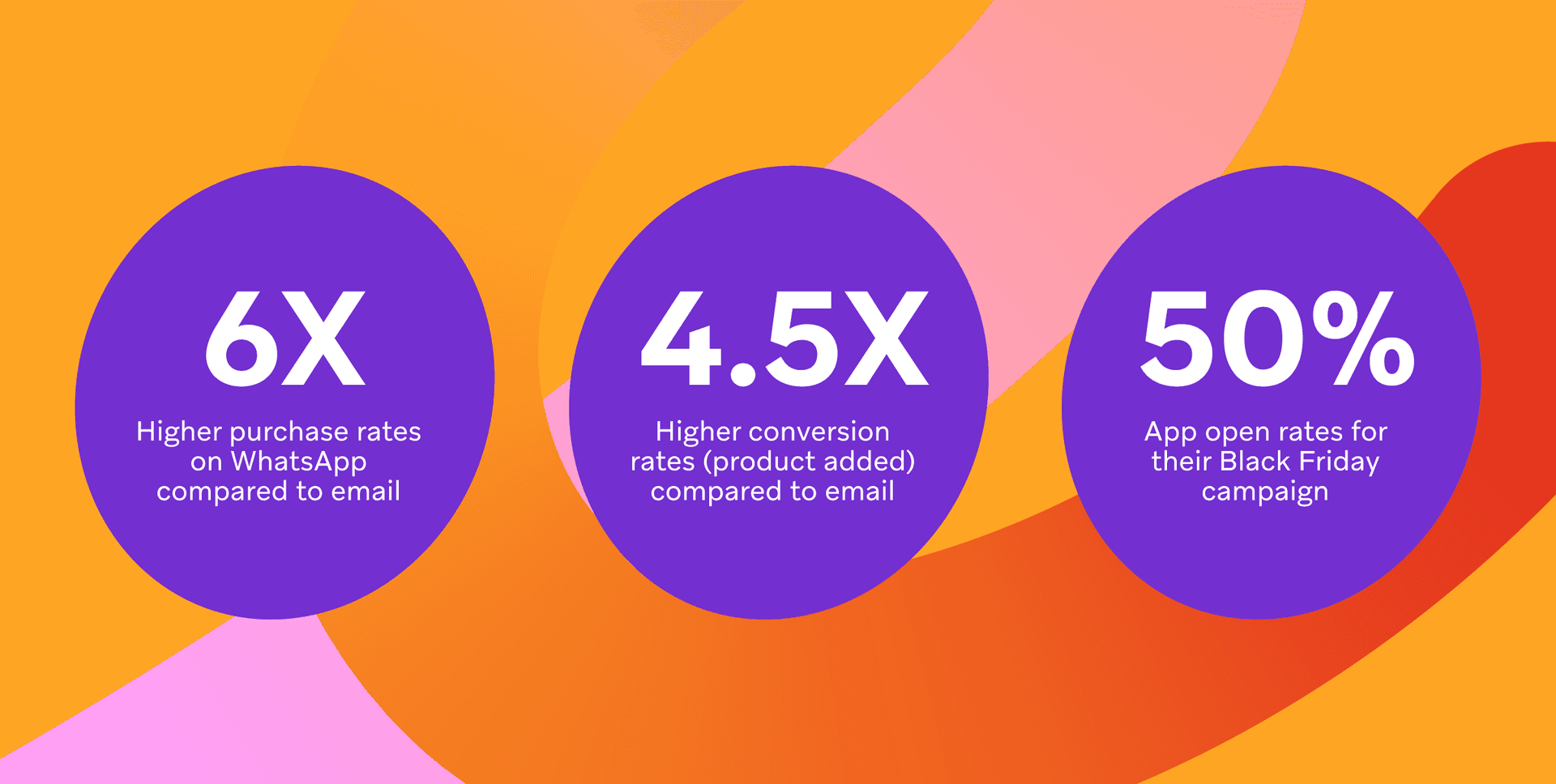
By embracing AI-driven messaging, Pazza Pasta didn’t just enhance engagement—they created a smarter, more seamless way to serve their customers.
Brick by brick: Building better customer engagement with AI
OneRoof is New Zealand’s go-to property platform, helping users navigate the real estate market with ease. From thousands of listings to market insights, property estimates, and key neighborhood data, OneRoof empowers buyers and sellers with the information they need to make confident decisions. With real estate moving fast, OneRoof recognized the need for timely, personalized communication to keep users engaged and informed.
The challenge
Despite already using email to connect with users, OneRoof faced several limitations. Customization required developer support, making it difficult for the marketing team to create dynamic, targeted campaigns. Without data integrations or custom attributes, emails often included generic listings, leading to missed opportunities for engagement. For instance, a user searching for a $950,000 property in Auckland might have received a listing for one in Wellington—nine hours away. OneRoof needed a smarter, more automated solution to personalize user experiences at scale.
The solution
By implementing Braze Intelligence Suite, OneRoof revolutionized its approach to customer engagement. Using machine learning and AI-driven automation, they developed highly targeted, multi-channel marketing strategies, including:
- Profile Builder: A new tool that collects declared user data, such as buying status and location preferences, enabling more personalized communications.
- Intelligent Timing: AI-driven optimization to send emails when users are most likely to engage.
- Localized newsletters and dynamic content: Automated, data-driven email campaigns featuring real-time listings, sales data, and curated editorial content based on user preferences, using our dynamic content tool and Liquid Personalization.
The results
The shift to AI-powered personalization delivered remarkable results. OneRoof saw a 23% increase in email click-to-open rates and a 77% completion rate for Profile Builder, turning more prospects into registered users. Moving from generic listings to localized recommendations drove a 218% increase in total clicks to property listings and a 57% uplift in unique clicks. With machine learning fine-tuning recommendations in real-time, OneRoof not only improved engagement but also delivered a seamless, relevant experience for every user.
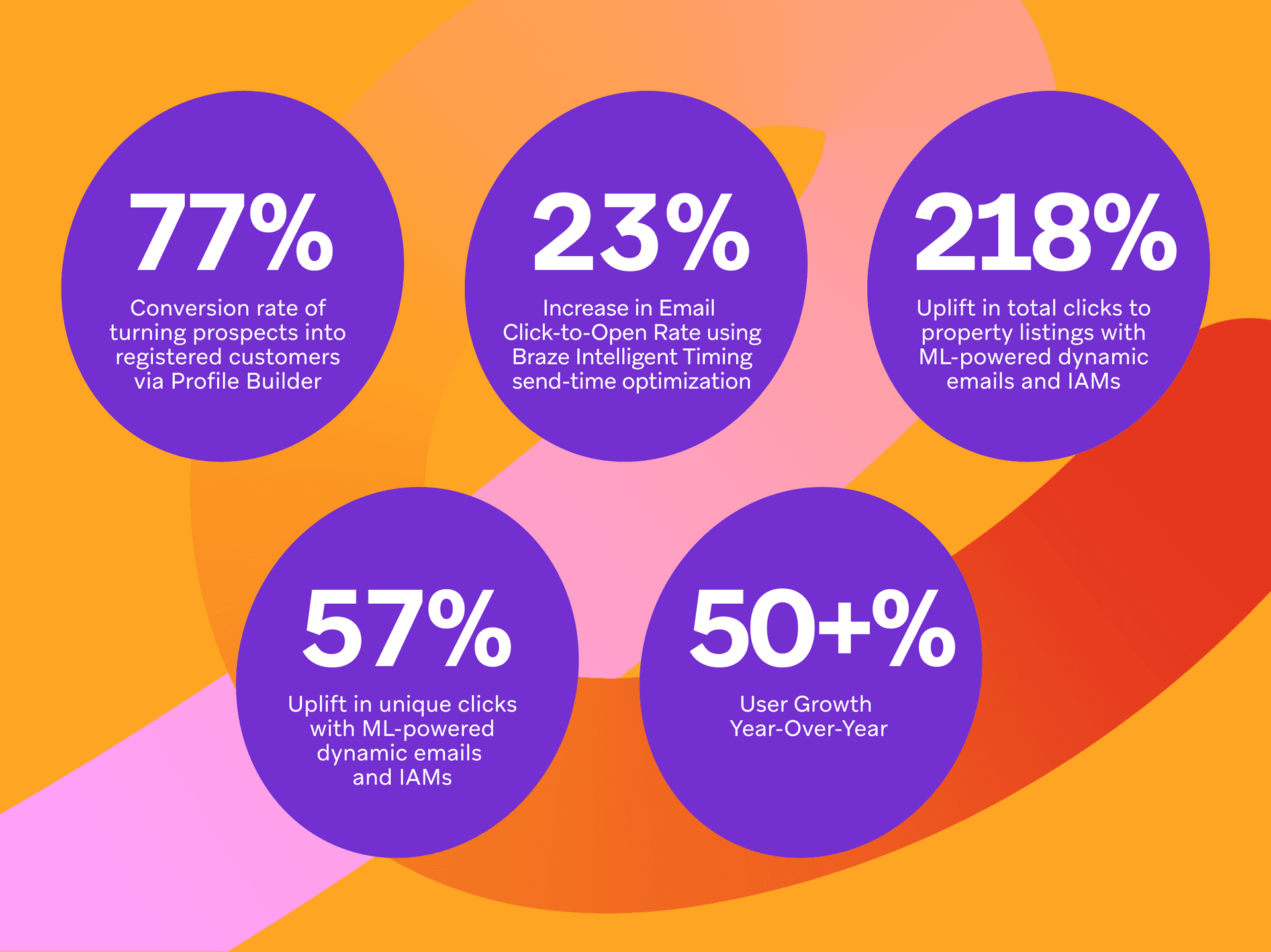
By embracing AI and automation, OneRoof has redefined property search communications—designed to ensure that users receive the right listings, at the right time, with zero wasted effort.
12 Essential artificial intelligence marketing solutions and tools
1. AI copywriting assistant
An AI Copywriting Assistant natural language generation tool makes it easy to whip up copy for use across channels, including push notifications, SMS, emails, and both in-browser and in-app messages. Furthermore, with Tone Control, you can decide the exact tone of the message that you are looking to generate. The BrazeAI™ Copywriting Assistant also allows you to make the most of customizable brand guidelines, while referencing your past campaign copy.
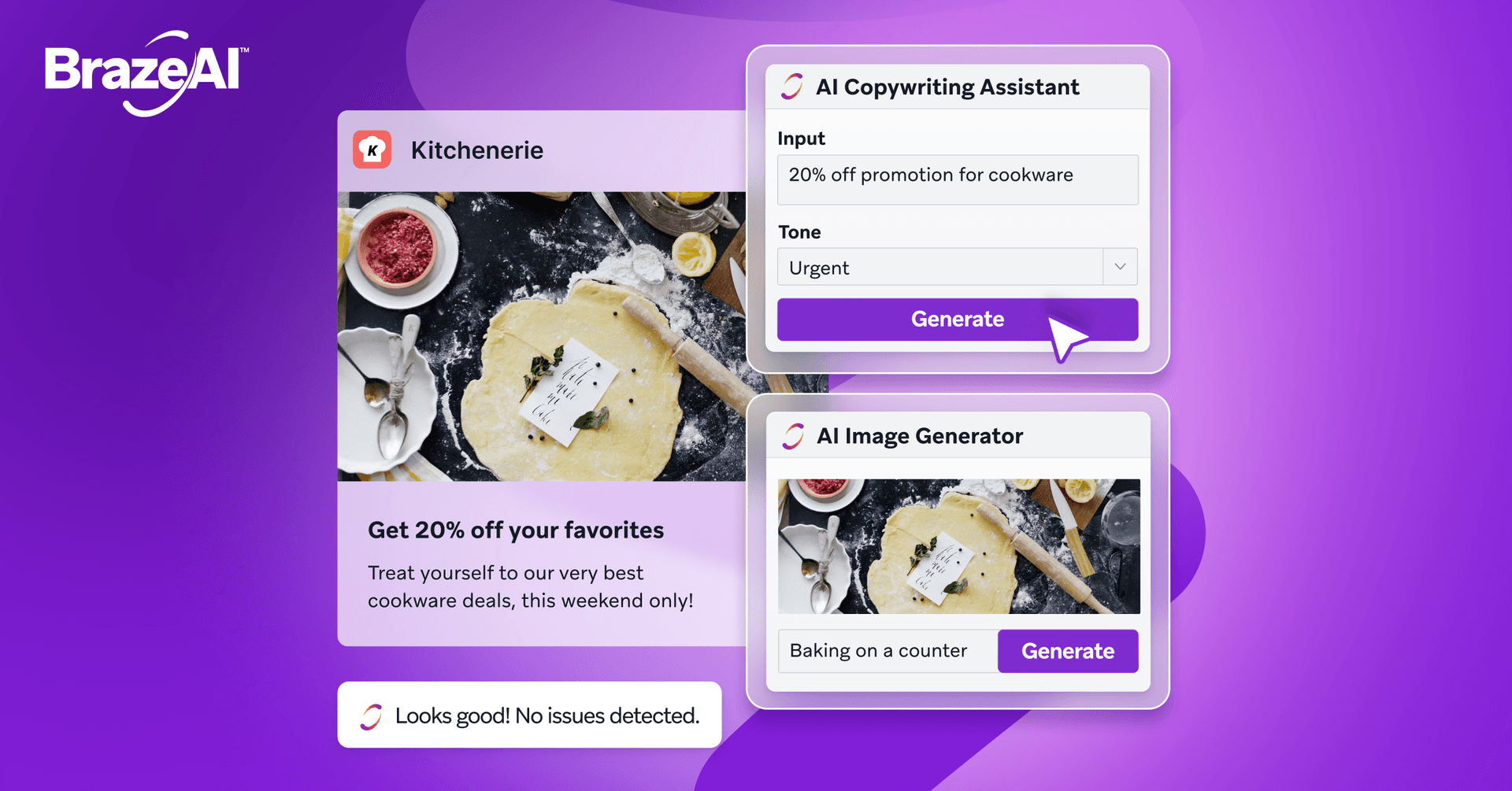
2. AI Image generator
The BrazeAI™ Image Generator, can give marketers a competitive advantage by empowering them to quickly advance from ideation to action without relying on (or waiting for) overburdened creative teams.
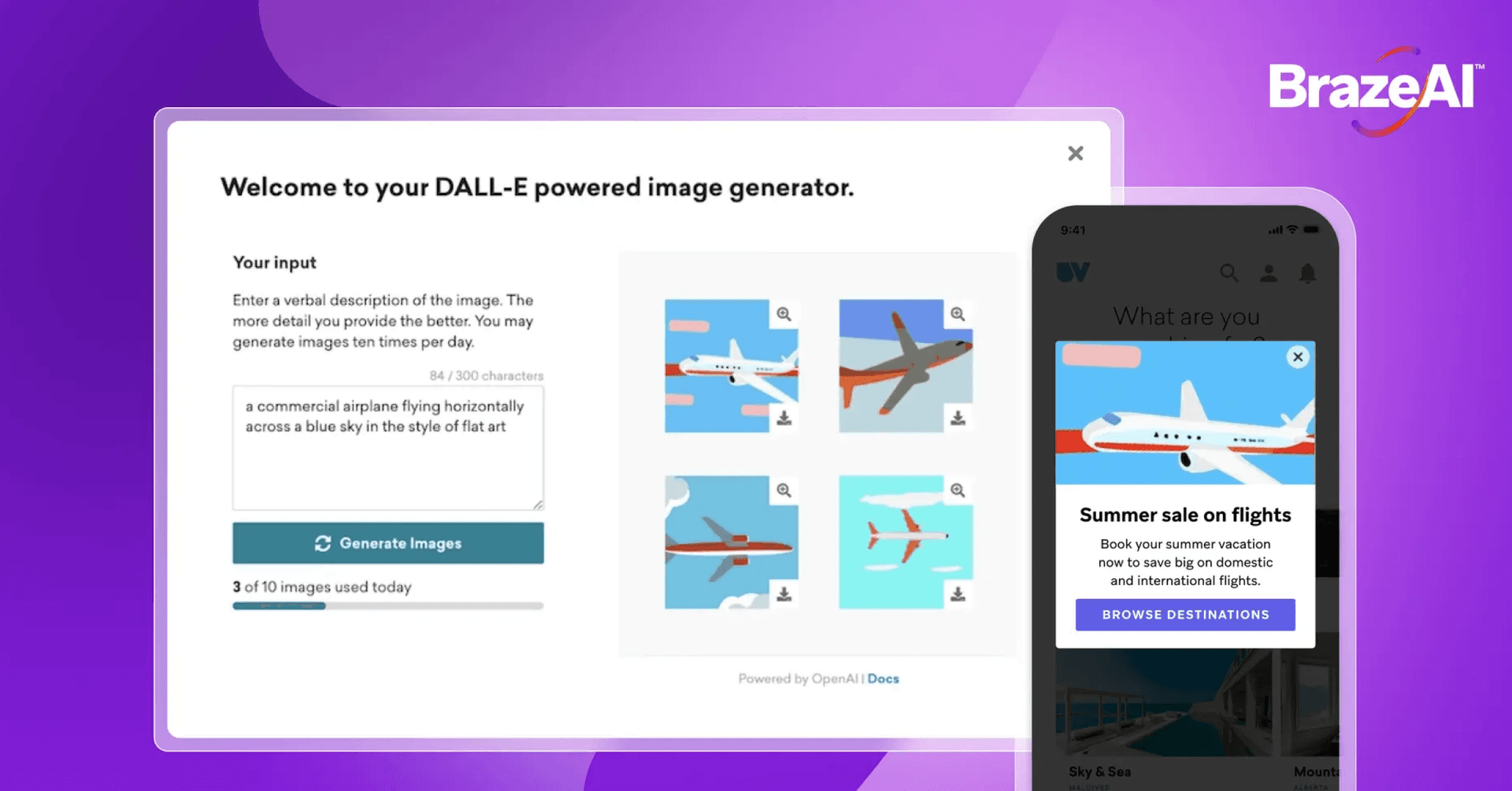
3. AI content QA
Tasks like checking for grammatical errors, inappropriate content, or an insensitive tone can be made easy with the AI Content QA tool, opening up bandwidth that can allow your team to focus on strategy instead.
4. AI item recommendations
AI Item Recommendations is designed to allow brands to surface the next best product, content, or items that are personalized to every customer at scale. Easily plug intelligent recommendations into campaigns on any channel to help customers find more value from your brand.
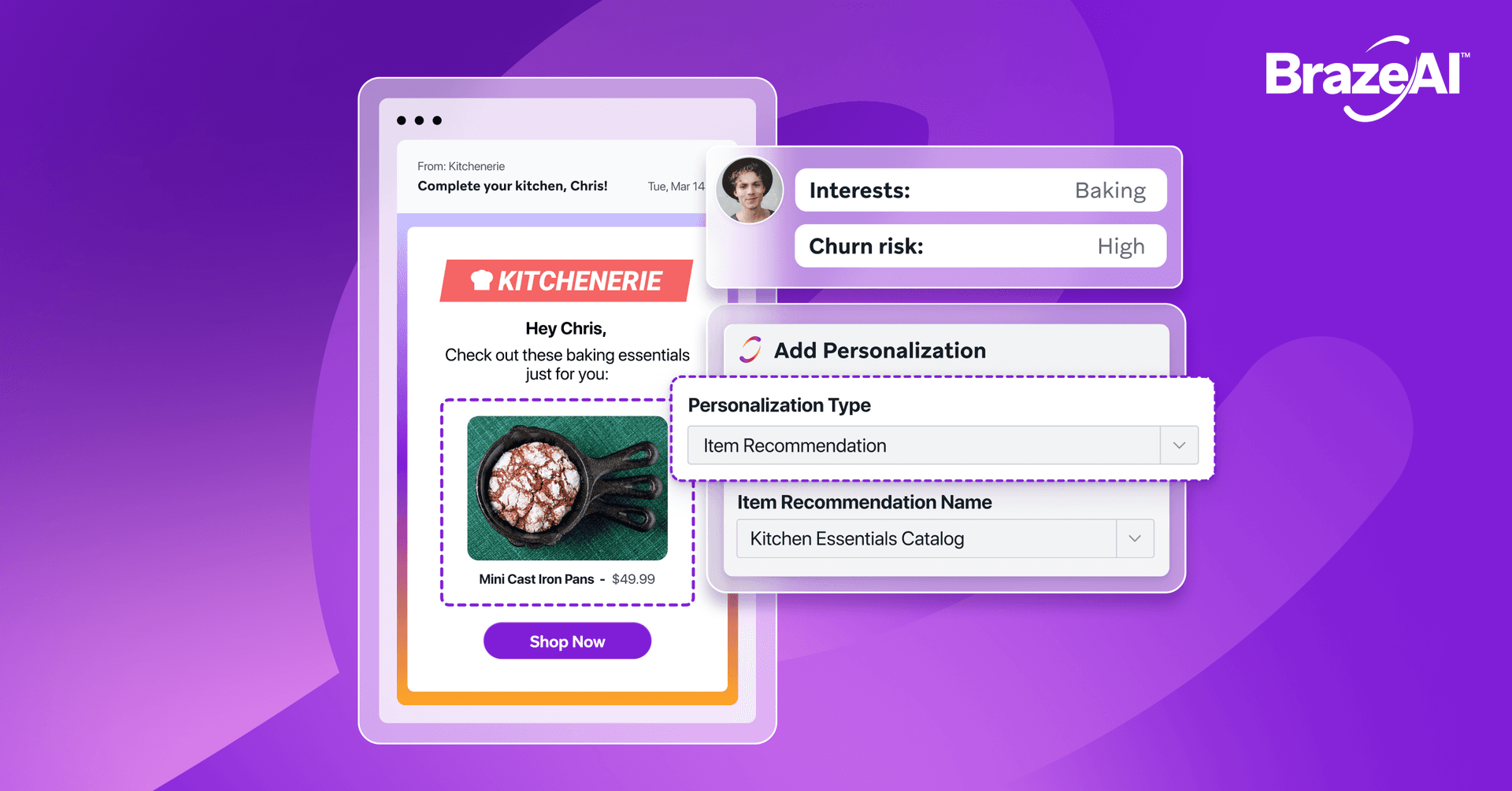
5. AI query builder
With the AI Query Builder, technical marketers can get a head start with a tool that creates SQL queries for generating bespoke, and customizable reports for the most granular insights—all from natural language prompts and descriptions.
6. Personalized variant
Braze Personalized Variant is designed to determine the message for each individual based on their unique behaviors, preferences, and attributes. This automates personalized messages from an A/B test to each individual that help increase engagement and conversions for each campaign.
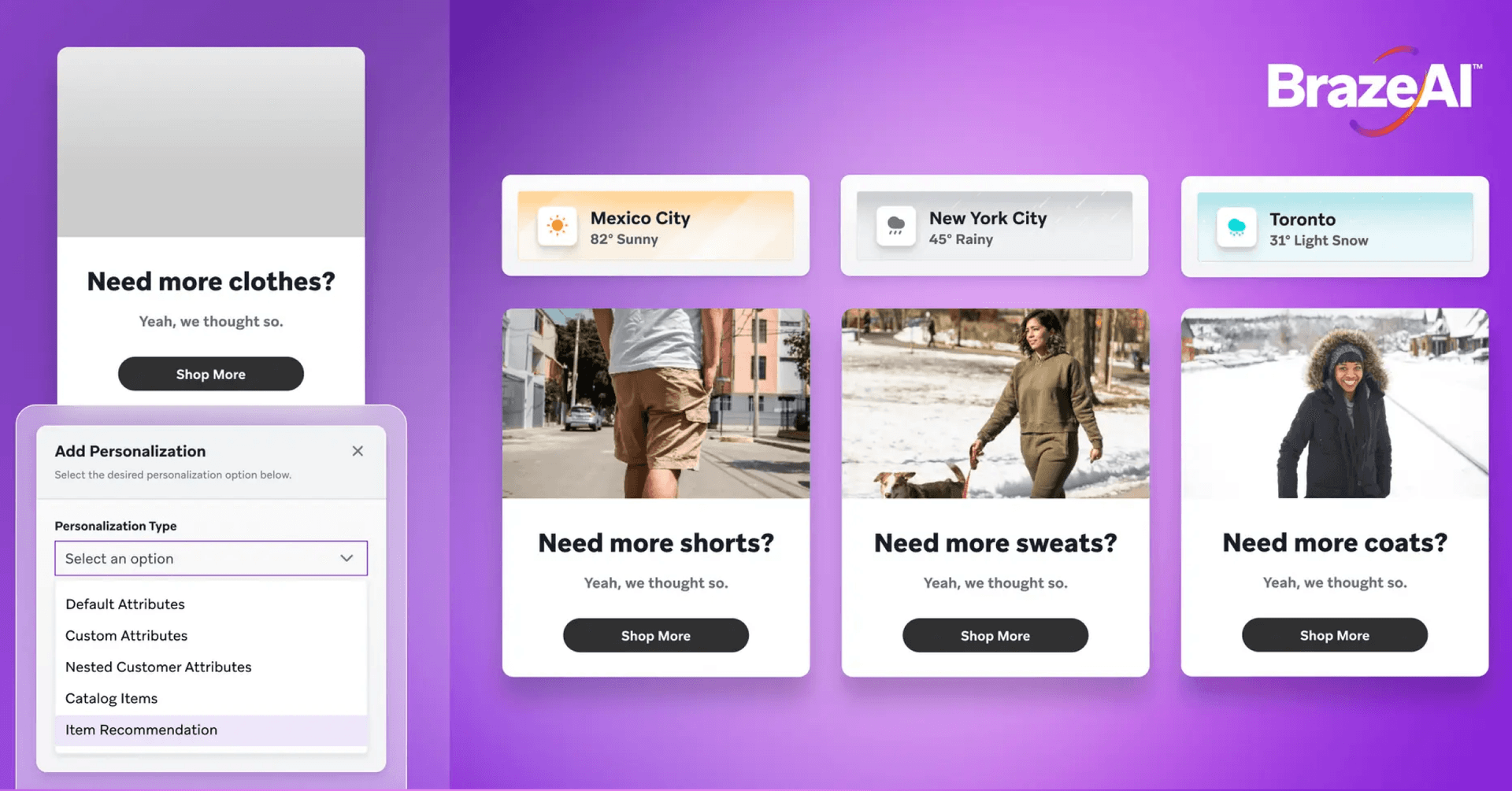
7. Personalized paths
Personalized Paths help facilitate true journey personalization at scale. This automates journeys that make sure each customer gets the message copy, creative, channel, offer, and more they’re most likely to engage with at every stage of a journey—all with a simple toggle from an a/b test.
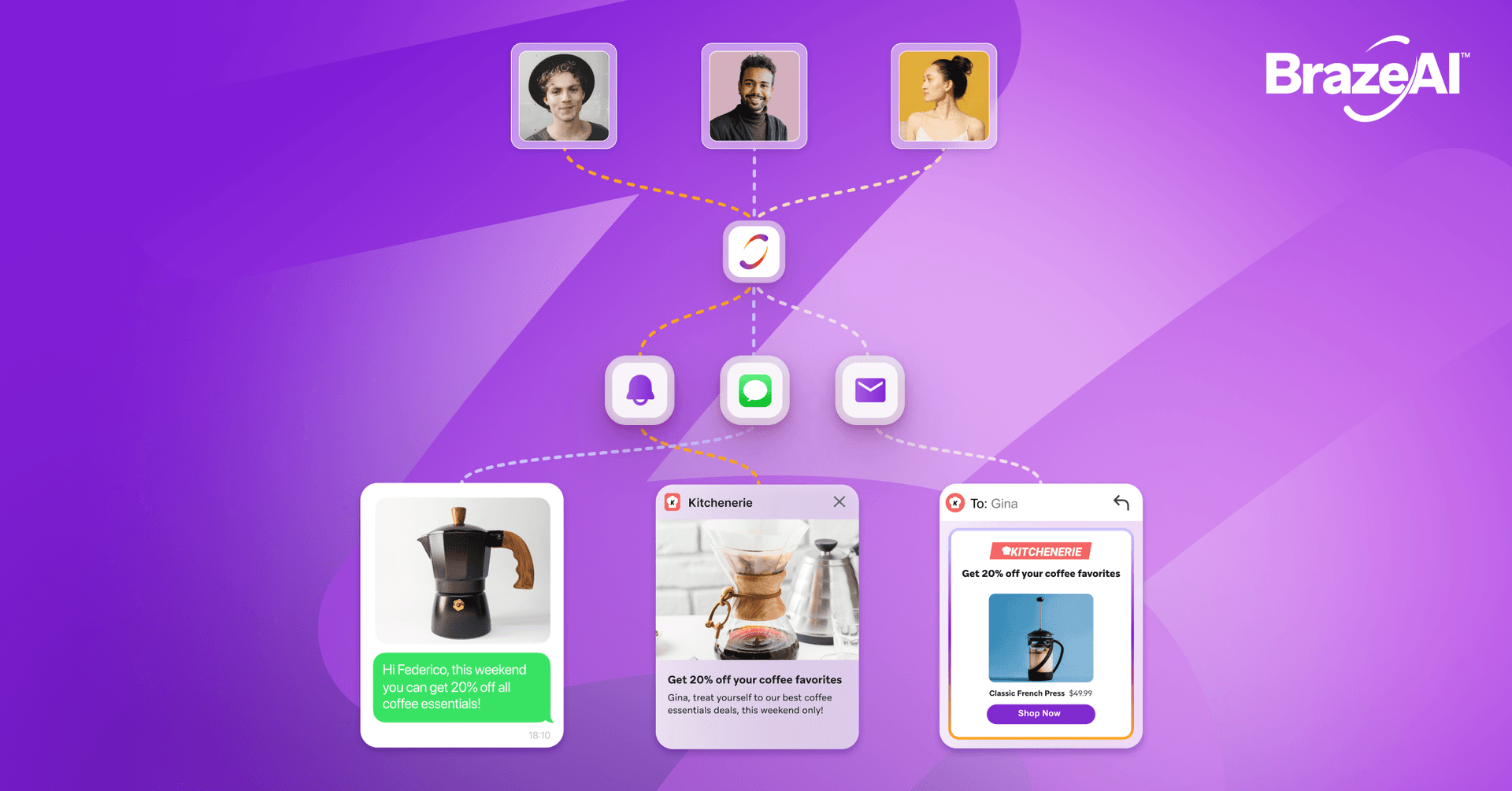
8. Predictive churn
With AI marketing tools like Braze Predictive Churn, brands can get ahead of potential retention issues before they become a problem. This solution identifies which customers are at risk of churning and flags the behaviors associated with churn so you can spring into action while you still have time. With this tool, you can use segments and filters within the Braze Audience Builder feature to create highly-targeted win-back campaigns to serve enticing promotions and incentives.
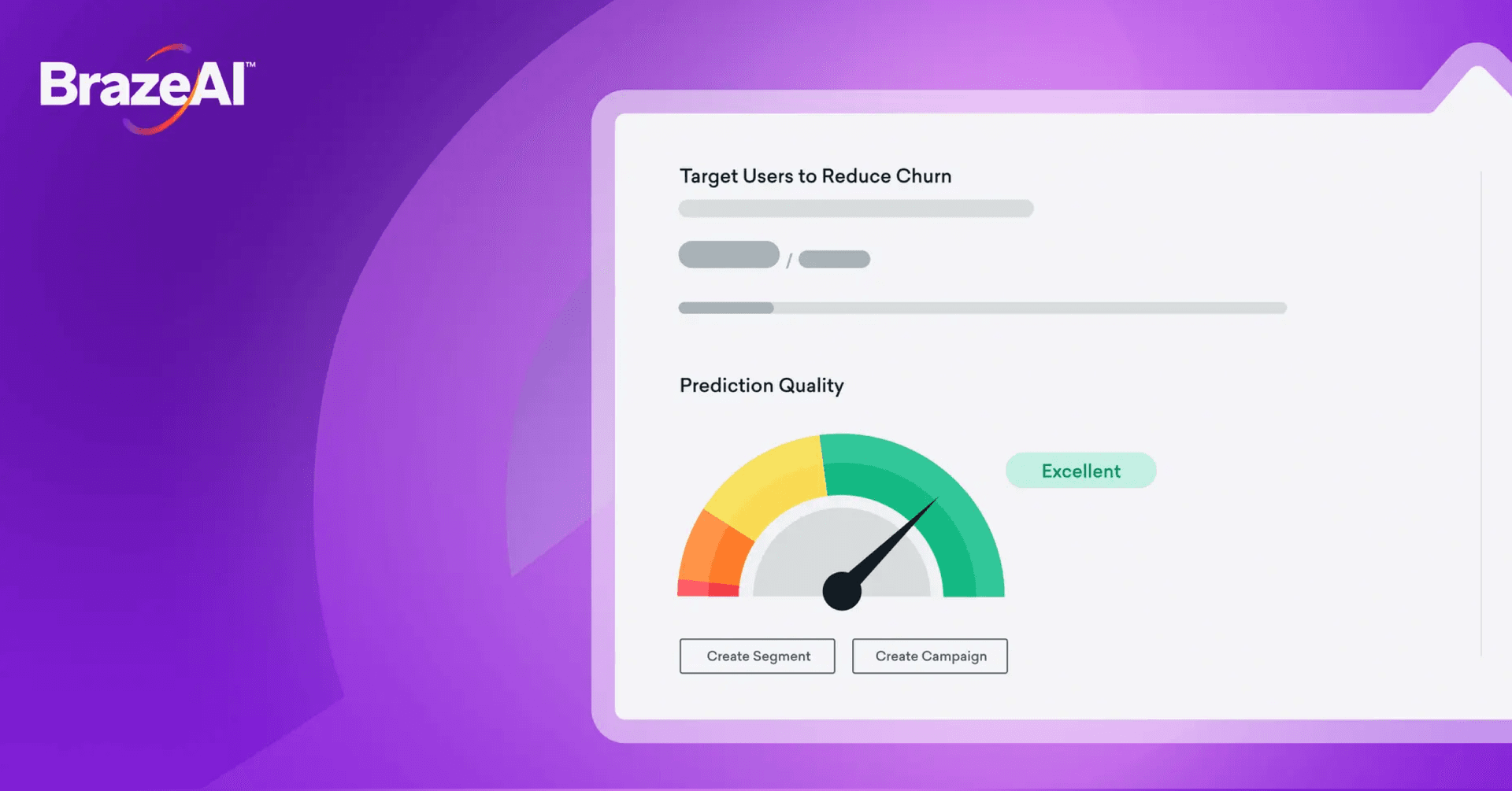
9. Predictive events
Braze Predictive Events is designed to interpret and predict a user’s likelihood to perform any custom event, such as purchasing a product, renewing a subscription, or even something like trying out a new feature. Using these insights, marketers can send relevant messaging prompts to encourage those users to perform a specific action.
From tempting previously unlikely shoppers to make their first purchase with a personalized promo code, or nudging those most likely to purchase to increase their order size, this feature can provide nearly endless possibilities for more effective engagement.
10. Intelligent timing
Solutions like Braze Intelligent Timing help send customers messages that reach customers when they want to hear from your brand. So, if your customer is active in the mornings or prefers to engage at night, you can rest easy knowing your campaign will go out when they are most likely to see it and take action.
11. Intelligent channel
Intelligent Channel sends messages to customers via their preferred engagement channel, as determined by their past engagement behavior.
12. Intelligent selection
Braze Intelligent Selection uses a reinforcement learning algorithm to determine which campaign each customer in a given segment receives based on campaign performance over time. This automates the shared campaign variant based on which one performs most effectively, allowing you to automatically send users the campaign variant that will give your team the best results.
13. Liquid assistant
With the AI Liquid Assistant, you can easily personalize messages at scale. By providing the idea using natural language prompts, BrazeAI™ will turn it into working Liquid code, making it faster to create, improve, and enhance customer experiences across channels and touchpoints.
How to overcome common challenges in AI marketing
While AI marketing offers incredible advantages, businesses often face challenges when integrating AI into their strategies. Understanding these obstacles and proactively addressing them can help with smoother adoption and greater success.
1. AI-generated content can feel robotic
The challenge: While AI can generate text, visuals, and videos, the output sometimes lacks human emotion, creativity, or brand voice consistency.
How to fix it:
- Use AI-generated content as a starting point, then refine and personalize it.
- Train AI models with your brand’s voice and style guidelines.
- Combine AI with human oversight so content remains engaging and on-brand.
- Train AI with the right data—AI-generated content will be better if it’s based on relevant first-party data
2. Over-reliance on automation
The challenge: AI-driven automation can streamline processes, but over-automation may lead to impersonal customer interactions.
How to fix it:
- Maintain a balance between AI automation and human intervention.
- Use AI for repetitive tasks (e.g., scheduling, segmentation) but keep human oversight in areas requiring empathy (e.g., customer service, high-touch sales processes).
- Enable manual overrides and leverage guardrails where needed to adjust AI-driven decisions.
3. Bias in AI decision-making
The challenge: AI algorithms can inadvertently reinforce biases if trained on biased datasets, leading to unfair customer targeting or skewed insights.
How to fix it:
- Use relevant data that will inform and empower more relevant decisioning at scale.
- Regularly audit AI decisions to detect and mitigate biases.
- Implement fairness-focused AI tools that flag and correct biases.
4. Lack of clear AI strategy and measurement metrics
The challenge: Many brands adopt AI without a structured strategy, leading to unclear objectives and difficulty measuring ROI.
How to fix it:
- Define clear goals for AI marketing (e.g., improved personalization, reduced churn, increased efficiency).
- Use AI-driven analytics to track KPIs like conversion rates, engagement, and customer retention.
- Continuously refine AI strategies based on performance insights and customer feedback.
- Build an AI culture within your organization
Final thoughts
As organizations face mounting competitive pressures and increasing demands for operational efficiency, many are turning to AI as a strategic necessity. If your team is feeling these same pressures to innovate and automate, BrazeAI™ can help guide you through this transformation. Our solution empowers marketing teams to work smarter, helping you craft, scale, and adapt the kind of memorable experiences that turn customers into long-term brand advocates.
No matter where you are in your engagement journey, Braze can take you where you want to go.
To help you get up to speed on how you can take your engagement strategy to the next level with the help of AI, check out AI-Powered Customer Engagement: A Braze Playbook.
Forward-Looking Statements
This blog post contains “forward-looking statements” within the meaning of the “safe harbor” provisions of the Private Securities Litigation Reform Act of 1995, including but not limited to, statements regarding the performance of and expected benefits from Braze and its products. These forward-looking statements are based on the current assumptions, expectations and beliefs of Braze, and are subject to substantial risks, uncertainties and changes in circumstances that may cause actual results, performance or achievements to be materially different from any future results, performance or achievements expressed or implied by the forward-looking statements. Further information on potential factors that could affect Braze results are included in the Braze Quarterly Report on Form 10-Q for the fiscal quarter ended October 31, 2024, filed with the U.S. Securities and Exchange Commission on December 10, 2024, and the other public filings of Braze with the U.S. Securities and Exchange Commission. The forward-looking statements included in this blog post represent the views of Braze only as of the date of this blog post, and Braze assumes no obligation, and does not intend to update these forward-looking statements, except as required by law.
FAQS
How can I develop an effective AI marketing strategy?
To develop an effective AI marketing strategy you should assess the areas where AI could be employed and how this might benefit the business and internal teams. Determine where your budget is best spent for maximum impact and whether your martech stack supports your goals.
What challenges should I expect when using AI in marketing?
AI in marketing can be incredibly powerful, but it comes with challenges. Common issues include effectiveness concerns, biases in AI models, and the need for high-quality data to get accurate insights. There’s also the risk of over-automation—if AI takes too much control, marketing can lose its human touch.
How does AI marketing improve customer engagement?
AI marketing improves customer engagement by helping brands create more personalized and timely interactions at scale. It can analyze customer behavior, predict preferences, and automate tailored recommendations, emails, and messages—more so than humans can do on their own. By delivering the right content to the right person at the right time, AI enhances user experiences and builds stronger connections for each person.
What role do AI advertising tools play in marketing campaigns?
AI plays a major role in optimizing marketing campaigns. AI advertising tools can automate strategies, identify high-performing audiences, and improve targeting by analyzing vast amounts of data. AI can also generate message copy, design creative elements, and A/B test variations at scale. This results in more effective, cost-efficient campaigns with higher conversion rates.
How is AI transforming email marketing?
AI transforms email marketing by taking it to the next level with personalized content, optimized send times, and automated responses based on user behavior. It can analyze engagement patterns to predict the best subject lines and content formats, leading to higher open and click-through rates. AI-driven segmentation also helps with making emails that are relevant to each recipient, increasing customer loyalty and reducing unsubscribes.
How does Braze use AI?
Braze uses AI to enhance customer engagement through BrazeAI™ features embedded in the platform. It helps brands deliver personalized messaging across channels like email, push notifications, and in-app messaging. With AI-powered insights, Braze optimizes customer journeys, predicts user behavior, and automates interactions to improve retention and conversions. Essentially, it combines AI with real-time data to make marketing campaigns smarter and more effective, so that you can make your brand absolutely engaging. What’s more, we’ve pulled together AI-Powered Customer Engagement: A Braze Playbook, to help you get up to speed on how you can take your engagement strategy to the next level with the help of AI.
Related Tags
Be Absolutely Engaging.™
Sign up for regular updates from Braze.
